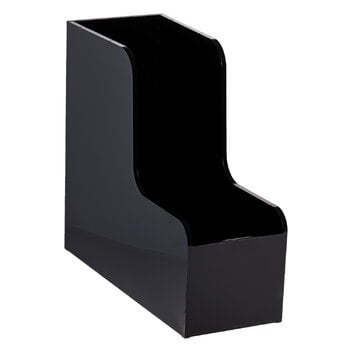The magazine rack from Palaset has been designed by Ristomatti Ratia. It is a steady magazine rack that is suitable both at home and in the office. The magazine rack is perfect for storing brochures, catalogues, copying papers, letters, magazines, etc.
Magazine rack, black
Palaset
Description
The magazine rack from Palaset has been designed by Ristomatti Ratia. It is a steady magazine rack that is suitable both at home and in the office. The magazine rack is perfect for storing brochures, catalogues, copying papers, letters, magazines, etc.
Product details (5)
- Material
- Plastic
- Colour
- Black
- Length
- 25.3 cm
- Width
- 10 cm
- Height
- 23 cm
- Product ID
Designer
Ristomatti Ratia (born 1941) is a Finnish designer and son of Armi Ratia, Marimekko’s founder. Ristomatti Ratia has created a wide range of products. Many of these have become familiar classics, such as the popular Marimekko shoulder bag, designed in 1970 for Marimekko, and the Palaset storage line.
For Marimekko he has designed also other classic bags – such as Arkkitehti bag, Matkuri bag and Mini Basic bag – which as the famous shoulder bag are characterized by functionality and style. Interiors are often the starting point for product design. Indeed, Ratia considers interior design to be his own area. From 1998, the design work has been focused under his own Ristomatti Ratia- trademark. Ratia Brand Co. represents the trademark and designs primarily interior decorating products and clothing for various corporate clients. These products reflect the Ratia Lifestyle, which is characterised by good design, an air of freshness and casual elegance.
View all productsReviews (2)
4.5
Based on 2 reviews
-
A
ADAM W
Magog, Canada
Beautiful, sturdy.
254 days ago
-
A
Anneli M
Sipoo, Finland
428 days ago
Sustainability
The Product Sustainability Framework, our criteria of sustainable design, helps you find the most sustainable products in our selection. Read below which sustainability criteria this product has met.
Working conditions & labour 7/9
-
Equal opportunities for all employees
-
Commitment to UN Global Compact, fair compensation for all employees
-
Corporate responsibility requirements defined and communicated for suppliers
-
Systematic work for improved inclusion and well-being in the workplace
-
Transparent supply chain
-
Suppliers' compliance to a code of conduct ensured
-
Support for community involvement in the supply chain
-
Direct suppliers audited and certified
-
Compliance to the UN Guiding Principles on Business and Human Rights ensured in the supply chain
Eco-friendly production 6/9
-
Fair and resource-wise water-use in production
-
No incineration or landfilling of returned items
-
No use of endangered species as materials
-
No direct environmental emissions or waste (excl. GHGs) from production
-
Material-efficient and ecological packaging
-
No potentially harmful chemicals used in own production
-
The sustainability of direct suppliers' production is addressed and monitored
-
Production and material sourcing that respect biodiversity, animal rights, and natural ecosystems
-
Positive impact on nature’s well-being through operations that regenerate natural ecosystems
Climate impact 4/8
-
Company's direct greenhouse gas emissions identified and commitment to reduction
-
Product's carbon impact identified and commitment to reduction
-
Guidance on energy- and eco-efficient use of the product
-
100 % renewable energy in own production and operations
-
Contribution to climate initiatives beyond the brand’s direct operations
-
Low-carbon or compensated transportation
-
Carbon footprint of the product calculated and goals set to reduce it
-
Carbon neutral or carbon negative product
Sustainable materials 5/6
-
Sustainable and long-lasting material choices
-
No harmful or hazardous substances
-
Responsible raw material sourcing and production
-
Materials suited for circularity: monomaterials, recyclable finishings, renewable or recycled contents etc.
-
Ecological materials: natural, biodegradable, recyclable or recycled contents
-
Outstanding materials in terms of innovativeness, responsibility, sustainability and circularity: local production or sourcing, 100 % recycled content, C2C-certification etc.
Circular design 4/5
-
High aesthetic quality promoting long-term use of the product
-
Technically durable product design and material choices
-
Design for enduring life-long quality
-
Design and support for product maintenance, repair and upgradability
-
Innovative circular design solutions: circular service system, resale platform, remanufacturing, collection of used products, etc.




